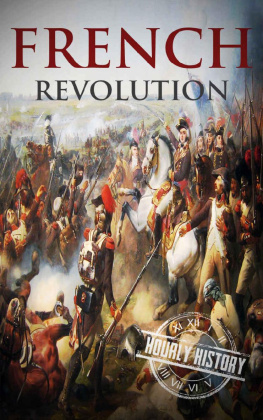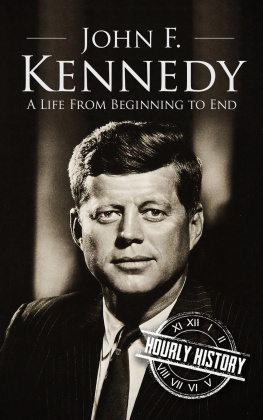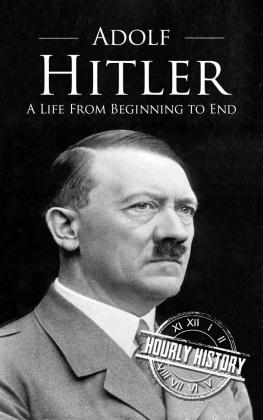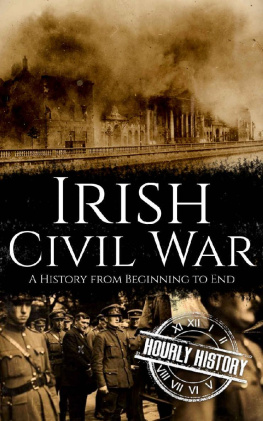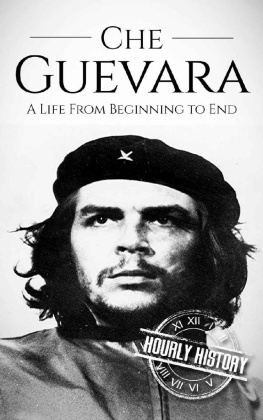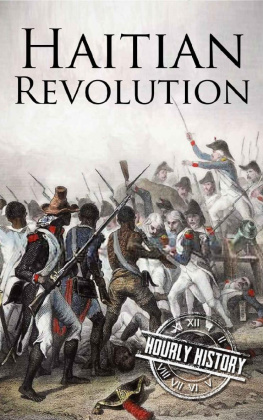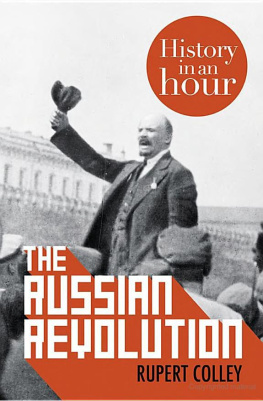Hourly History - French Revolution: A History From Beginning to End (One Hour History Revolution Book 1)
Here you can read online Hourly History - French Revolution: A History From Beginning to End (One Hour History Revolution Book 1) full text of the book (entire story) in english for free. Download pdf and epub, get meaning, cover and reviews about this ebook. year: 2016, publisher: Hourly History, genre: Politics. Description of the work, (preface) as well as reviews are available. Best literature library LitArk.com created for fans of good reading and offers a wide selection of genres:
Romance novel
Science fiction
Adventure
Detective
Science
History
Home and family
Prose
Art
Politics
Computer
Non-fiction
Religion
Business
Children
Humor
Choose a favorite category and find really read worthwhile books. Enjoy immersion in the world of imagination, feel the emotions of the characters or learn something new for yourself, make an fascinating discovery.
- Book:French Revolution: A History From Beginning to End (One Hour History Revolution Book 1)
- Author:
- Publisher:Hourly History
- Genre:
- Year:2016
- Rating:4 / 5
- Favourites:Add to favourites
- Your mark:
- 80
- 1
- 2
- 3
- 4
- 5
French Revolution: A History From Beginning to End (One Hour History Revolution Book 1): summary, description and annotation
We offer to read an annotation, description, summary or preface (depends on what the author of the book "French Revolution: A History From Beginning to End (One Hour History Revolution Book 1)" wrote himself). If you haven't found the necessary information about the book — write in the comments, we will try to find it.
Hourly History: author's other books
Who wrote French Revolution: A History From Beginning to End (One Hour History Revolution Book 1)? Find out the surname, the name of the author of the book and a list of all author's works by series.
French Revolution: A History From Beginning to End (One Hour History Revolution Book 1) — read online for free the complete book (whole text) full work
Below is the text of the book, divided by pages. System saving the place of the last page read, allows you to conveniently read the book "French Revolution: A History From Beginning to End (One Hour History Revolution Book 1)" online for free, without having to search again every time where you left off. Put a bookmark, and you can go to the page where you finished reading at any time.
Font size:
Interval:
Bookmark:
Copyright 2016 by Hourly History Limited
All rights reserved.
During the late years of the eighteenth century, the spirit of Enlightenment thinking and revolution were in the air. The world was changingmoving away from ingrained beliefs about religion, reason, society, and the rights of the individual and turning towards the laws of nature as interpreted by the scientific method. Nowhere was the influence of this radical new way of thinking more apparent than in France, and the upheaval it caused would come to bloody fruition in the form of revolution.
The Age of Enlightenment, also known as the Age of Reason and the Siecle des Lumieres in French, began slowly in the late seventeenth century and then spread to the height of its popularity in the eighteenth century when Enlightenment ideas became common topics in social clubs and meeting places throughout Europe. The world of science had gone through its own revolution, moving toward empirical observation and the scientific method and away from religious dogma and the structure of absolute monarchy. The work of Copernicus "De revoltionibus orbium coelestium," or "On the Revolutions of the Heavenly Spheres," Galileo Galileis "Dialogue Concerning the Two Chief World Systems," and Isaac Newtons "Philosophiae Naturalis Principia Mathematica," or "Mathematical Principles of Natural Philosophy," described natural truths that gave the world constants and predictability where before were mystery and prophecy. Philosophers like John Locke brought "natural law" into societal discourse in his "Essay Concerning Human Understanding," and Thomas Hobbes, in his "Leviathan," wrote of the nature of equality and the natural state of mankind and championed reforms of government. In France, publications by Enlightenment thinkers, like Voltaire's "On Tolerance," Rousseau's "Emile," Montesquieu's "De l'Espirit des Lois," Comte Buffon's "L'Histoire Naturalle," and Diderot's "On the Interpretation of Nature," spoke about religious and political freedoms as well as views on the nature of humanity and the equality of all men. Rousseau, in particular, argued against the long-held belief that monarchs ruled by divine right with his work "The Social Contract", saying, "Let us then admit that force does not create right, and that we are obliged to obey only legitimate powers," which would have great influence in the years to come.
Across the Atlantic, Enlightenment thinking had inspired the thirteen American colonies to revolt against British rule by refusing to abide by taxation passed without representation among other injustices. As a political writer, who borrowed heavily from European Enlightenment writers like John Locke, Thomas Jefferson wrote the American Declaration of Independence and even the new American Constitution wrote of Enlightenment ideas as the foundation of society. Benjamin Franklinauthor, philosopher, and inventorwas another leader of the American Revolution. His views on social structure, including such phrases as "Rebellion to tyrants is obedience to God," and "They who can give up essential liberty to obtain a little temporary safety deserve neither liberty nor safety," made him a popular figure in France when he visited as America's diplomatic representative to secure aid from the French government. The French monarchy contributed more than a billion livres, troops, and naval support to support the American Revolution. It is assumed that this generosity was based in large part on King Louis XVI's hatred for England after the English took over most of France's colonial territories, including Canada, France's foothold in the New World, in the Seven Years War. Another motivating factor was the possible recovery of those territories should the Americans prove successful. An army of French soldiers and a large French naval fleet would play deciding roles in the American struggle for independence, particularly the French naval blockade against the dominant British navy and the French forces that took part in the eventual British surrender at Yorktown. The American Revolution, which came to its conclusion in 1781 with the rebellious American colonists victorious against the might of the British army, was an amazing upset of world power. This victory, resulting in a government based on popular sovereignty, provided a solid example of the power of the common citizen to make societal changes, even against staggering odds. The parallels to the situation in France were obvious; common people revolting against a powerful king whose rule denied them the rights they felt God had given them. The language used in the American Declaration of Independence, which enumerated the reasons colonists felt it was their duty to revolt and how life, liberty, and the pursuit of happiness were rights due to all men equally, as well as the example of successful revolution were well received by the French citizens who were struggling under the inept and extravagant rule of King Louis XVI.
Beyond the money and the expenses of providing personnel, military and naval support to support the American revolutionaries, the French treasury was severely strained by the losses sustained during the Seven Years War, as well as the exorbitant debt incurred by the monarchy during the reign of the king's father and his grandfather, who had spared no expense redesigning the royal hunting lodge in the forest around Versailles into one of the largest palaces in the world simply because he wanted to get away from the stress of life at the palace in Paris. The new queen, Marie Antoinette of Austria, was a young girl who understood little about the people she came to rule. She was flamboyant and extravagant, spending lavishly on dresses and jewelry. Even her extreme hairstyles, piled high and decorated with elements like miniature ships, fruit, and jewels, became a symbol to the people of France of the utter disconnect between their lives and the lives of their rulers. Her expenditures were a visible drain on an already struggling economy and garnered ill will from her destitute subjects. In fact, she became known in Paris as "Madame Deficit." It did not help her image that in four years of marriage, she had not yet produced an heir to the throne, which was considered the purpose of a queen. Although it had been proven that the King suffered from a medical condition that was the true cause of the barren marriage, this was not something that was explained to the common people. After the King underwent a necessary surgery, the couple was able to conceive and eventually have four children, including the heir to the throne, Louis Joseph.
The tense situation was only exacerbated when bad weather and poor harvests in the mid-1780s caused a food shortage. Most damaging was the shortage of bread, which was the main source of food for the poor peasants of France. It was the traditional responsibility of the king to make sure the peasants had an adequate supply. Because of this, the king was often called "le premier boulanger du royaume," or "the prime baker of the kingdom." During this period of food shortage, grain merchants were viewed with suspicion by the hungry citizenry. They were called the "most cruel enemies of the people," because it was believed they hoarded grain and mixed in other substances, such as crushed bone meal and chalk, in order to inflate their profits. In response to the scarcity of bread, noble houses and country estates were attacked and looted by hungry citizens in search of food with alarming frequency. These riots by peasants living in the French country were known as "la Grand Peur" or the Great Fear. Food prices soared as supply was even scarcer and the overtaxed citizens of the Third Estate, which made up ninety-eight percent of the total population, were starving and angry. Change was inevitable, and when it came, it was terrifying.
Font size:
Interval:
Bookmark:
Similar books «French Revolution: A History From Beginning to End (One Hour History Revolution Book 1)»
Look at similar books to French Revolution: A History From Beginning to End (One Hour History Revolution Book 1). We have selected literature similar in name and meaning in the hope of providing readers with more options to find new, interesting, not yet read works.
Discussion, reviews of the book French Revolution: A History From Beginning to End (One Hour History Revolution Book 1) and just readers' own opinions. Leave your comments, write what you think about the work, its meaning or the main characters. Specify what exactly you liked and what you didn't like, and why you think so.

